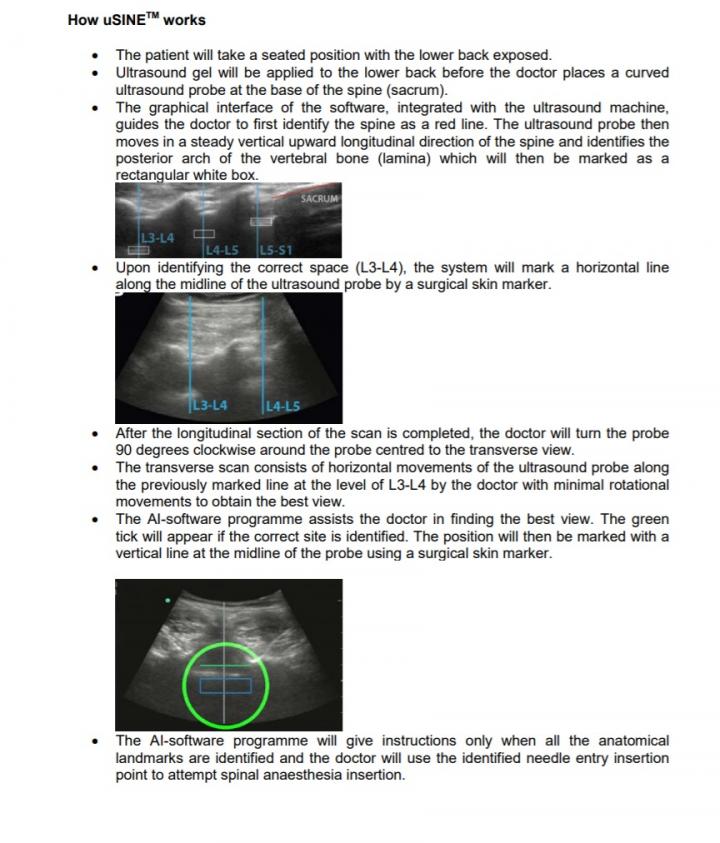Study shows that world’s first AI-powered ultrasound guided automated spinal landmark identification system increases accuracy and success rate of first-attempt needle insertion in spinal anaesthesia

Credit: KK Women’s and Children’s Hospital
Singapore, 31 October 2019 – A study conducted by KK Women’s and Children’s Hospital (KKH) and National University of Singapore’s (NUS) Faculty of Engineering shows that a world’s first novel artificial intelligence (AI)-powered ultrasound guided automated spinal landmark identification system, called uSINETM, enhances patient care by improving the accuracy and success rate of first attempt needle insertion during spinal anaesthesia.
Led by KKH, in collaboration with researchers from the NUS Department of Electrical and Computer Engineering, uSINETM is a novel technology that uses ultrasound imaging and AI to automatically identify the spinal level of insertion and the midline, so that the spinal needle insertion involved during spinal anaesthesia can be more precise and require fewer attempts. Using a proprietary machine learning algorithm, uSINETM automatically identifies anatomical landmarks during an ultrasound scan, and the anaesthetist is alerted in real-time when the right location and right angle are found.
A clinical study led by KKH was conducted to evaluate the first attempt success rate of spinal anaesthesia using landmarks obtained from uSINETM. It involved 100 women who underwent spinal anaesthesia for surgical procedures at KKH from May 2016 to May 2017. With the use of uSINETM, the success rate for the first attempt needle insertion during spinal anaesthesia was high, at 92 per cent.
Neuraxial anaesthesia procedures are performed by placing a needle between the vertebrae and injecting medication into the epidural or spinal space. These are performed for surgical procedures such as caesarean sections, labour epidural analgesia and some gynaecological surgeries. In the United States of America, more than 1.4 million caesarean sections and 700,000 epidural procedures are performed every year.
Precise needle insertion will improve quality of anaesthesia and reduce complications such as abnormal sensation to the skin such as tingling or prickling (paraesthesia) due to nerve irritation, and blood collection within the tissues in the spine (spinal haematoma). Spinal anaesthesia involves delivering local anaesthetics into the fluid space surrounding the spinal canal. Conventionally, a doctor uses his hands to manually identify the landmark for spinal needle insertion. This requires good knowledge of the anatomy and skills due to its complexity, and it becomes more challenging in patients who are obese, have an abnormal spine or had a previous spine surgery. Difficult needle placement could lead to higher rate of complications such as multiple attempts, failed anaesthesia, or neurological injury.
Senior author of the published study, Associate Professor Sng Ban Leong, Head and Senior Consultant, Department of Women’s Anaesthesia, KKH, said, “Worldwide, we know that neuraxial anaesthesia is used in many obstetrical and gynaecological procedures. Hence as the largest maternity hospital in Singapore, we want to improve the care for our patients in this area, and uSINETM will help enable this. uSINETM not only reduces the anxiety, discomfort and pain associated with multiple needle insertions, it also reduces the complications associated with it. Furthermore, this novel AI-powered system also plays a significant role in training doctors specialising in anaesthesia to better identify correct spinal landmarks.”
The study team will be looking at further enhancing the AI-powered system and investigating the use of the system in high-risk patients. uSINETM has been licensed to NUS spin-off company, HiCura Medical Pte Ltd, for commercialisation. Efforts to introduce the AI-powered system into clinical practice are ongoing.
###
The clinical study was approved by the SingHealth Centralised Institutional Review Board and funded by the SingHealth Foundation and National Health Innovation Centre Joint Medical Technology Grant and the National Medical Research Council Centre Grant.
For more information, please contact:
Angeline Chen
Assistant Manager
Corporate Communications
KK Women’s and Children’s Hospital
Tel : 6394 2321
Email: [email protected]
Poo Zhi Hui
Manager
Corporate Communications
KK Women’s and Children’s Hospital
Tel : 6394 8558
Email: [email protected]
About KK Women’s and Children’s Hospital
KK Women’s and Children’s Hospital (KKH) is Singapore’s largest tertiary referral centre for Obstetrics, Gynaecology, Paediatrics and Neonatology. Founded in 1858, the academic medical institution specialises in the management of high-risk conditions in women and children. A team of about 500 specialists adopt a compassionate, multi-disciplinary and holistic approach to treatment, and harness medical innovations and technology to deliver the best medical care possible. Accredited as an Academic Medical Centre, KKH is a major teaching hospital for all three medical schools in Singapore, Duke-NUS Medical School, Yong Loo Lin School of Medicine and Lee Kong Chian School of Medicine. The 830-bed hospital also runs the largest specialist training programme for Obstetrics and Gynaecology and Paediatrics in the country. Both programmes are accredited by the Accreditation Council for Graduate Medical Education International (ACGME-I), and are highly rated for the high quality of clinical teaching and the commitment to translational research. For more information, please visit http://www.
Media Contact
Angeline Chen
[email protected]
65-639-42321




